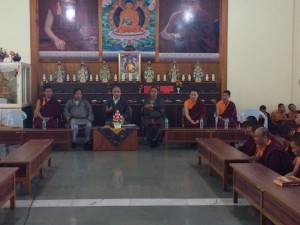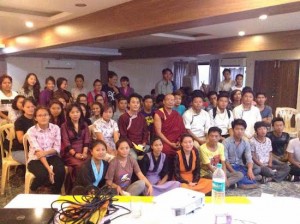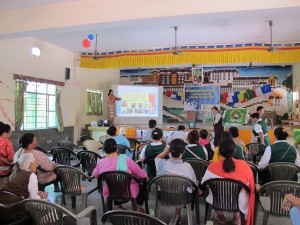
Election Commissioner Sonam Choephel Shosur with representatives from Bylakuppe Tibetan settlement and monasteries.
Photo: tibet.net
The 2016 preliminary election for Sikyong (prime minister) and Chithue (members of parliament) of the Tibetan-Government-in Exile is just a month away and the season of Tibetan election campaigning is well underway.
Tibetans living in exile are becoming energetically involved in democracy as they gear up for the 2016 election. This is despite China’s recent show at the beginning of this month of their control over Tibet, with the grand celebration of the 50th anniversary of the establishment of Tibet Autonomous Region, and China’s declaration that Tibet has entered a “golden age” under Communist rule.

Additional Election Commissioner Ven Geshe Tenpa Tashi with Tibetan college students in Baroda
Photo: tibet.net
The Election Commission team (which is run by the Central Tibetan Administration) is running programmes to raise awareness about the forthcoming election; they started this programme with a three-day workshop in July for over 80 administrators and members of the regional election commission team. In addition, the Election Commissioner and the two Additional Election Commissioners have to date visited around 84 Tibetan settlements and communities to raise public awareness about the election rules and regulations, their involvement and responsibilities.
On September 3, the Election Commission released a clarified version of the election code of conduct for the candidates and their supporters.
The Tibetan Women’s Association (TWA), one of the largest Tibetan Non-Government Organisations in exile, has conducted workshops in 42 Tibetan settlements across India, Nepal and Bhutan on democracy and the election. Tsering Dolma, Vice-President of TWA, said “We don’t promote or campaign for any candidate. The aim of our workshop is to encourage the maximum participation of the general public in the election so that the best candidate can lead our society.”
The general public’s participation and interest in the process of democratically electing their leader is evident from the large numbers of people attending the talks of each of the Sikyong candidates. A new development for this election is the use of social media to share stories, opinions and information about the candidates via platforms such as Facebook, Wechat, Whatsapp etc. Groups on various social media platforms having discussion and debates about the candidacies are seen as a positive development of the people’s involvement in the evolution of democratic system.
One such ongoing debate in the exile community was about the statement made by Penpa Tsering, the current speaker of Parliament and one of the five candidates for the Sikyong post, that he will not share a podium with individuals who have made defaming statements against His Holiness the Dalai Lama. Articles have been written about this issue in English and in Tibetan. Many individual responses were also circulated.
“It is my right to not associate with a person who has made derogatory remarks towards the Dalai Lama, I am exercising my right which does not restrict the other person’s right to speak or do anything,” said Penpa Tsering to Phayul. He further explained that he is not against people who stand for independence as their goal for Tibet. He draws a distinction between people supporting independence as an approach for Tibet’s struggle and those who make derogatory remarks towards His Holiness the Dalai Lama.
Lukar Jam is the only one of the five Sikyong candidates who stand for independence, whilst the other four support the current government’s Middle Way Approach. Based on his views and works, Lukar has been labelled by some people as “anti-Dalai Lama”. When approached by Phayul for a comment on these allegations he said, “Running for Sikyong this time has given me an opportunity to tell people about my true stand and my views on His Holiness the Dalai Lama. I am happy for that”. In the midst of all this, Lukar Jam believes that he can win the Sikyong post with the growing number of people striving for Rangzen (complete independence from China), and people losing faith in the current official Middle Way Approach.
The Tibetan Political Review is concerned that the election rules published by the Election Commission last month may not be strictly adhered to by all five candidates, and speculates on whether this will result in the penalties stipulated by the Commission. They acknowledge the difficulties of differentiating between official government business carried out by candidates who currently hold positions in the government, and their campaigning activities, but suggest that the Commission might want to clarify their intentions regarding the enforcement of the rules about using images of His Holiness, the Tibetan flag, or the CTA logo in campaigning materials.
Keep up to date on election issues by following this link to our election news page: Election 2016






 Print
Print Email
Email